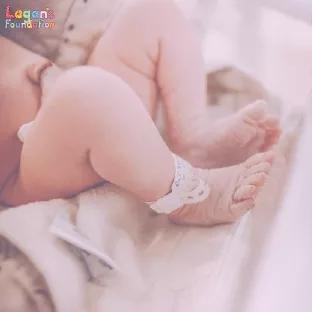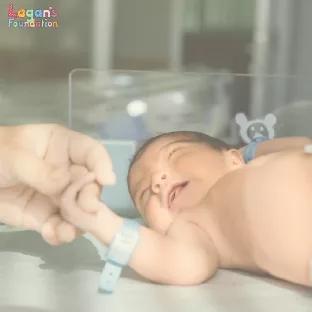DiGeorge Syndrome and Associated Heart Defects
Genetic Condition
DiGeorge Syndrome is a genetic condition caused by a missing piece of chromosome 22. Symptoms of the condition can affect your heart, immune system and other organs, as well as causing distinct facial characteristics. Treatment can be used to manage these symptoms, however, there is no cure.
What is DiGeorge Syndrome?
DiGeorge Syndrome is a birth condition caused by a small part of chromosome 22 being absent. This ‘deletion’ causes several body parts to develop poorly, including the heart.
The severity of DiGeorge Syndrome varies, with some children being severely affected by the condition and others growing up without even realising they have it.
What is 22q11.2 deletion syndrome?
22q11.2 deletion syndrome is another term used for DiGeorge Syndrome, although they were once thought to be different conditions. The deletion of chromosome 22 is in the middle of the chromosome at a location designated to q11.2.

What are the cardiac defects associated with DiGeorge syndrome?
Congenital heart defects are present in the majority of children who are diagnosed with DiGeorge syndrome. The most common types of heart defects are:
- Ventricular Septal Defects
- Truncus Arteriosus
- Tetralogy of Fallot
- Underdeveloped Aorta
These congenital heart defects may be detected prior to birth, or just after, and they usually require management soon after birth as they can cause difficulty with circulation, breathing and/or growth. Many children born with DiGeorge Syndrome and who also have a congenital heart defect will require lifelong cardiac care.
Book in for our Respite Care ServiceAre there other comorbidities of DiGeorge syndrome?
DiGeorge syndrome can cause a range of different problems, but most people will not all have of them.
Some of the most common issues include:
- Learning or behavioural issues, including delays in walking and talking, as well as problems such as ADHD
- Speech and hearing problems including temporary hearing loss, being slow to start talking and having a nasal sounding voice
- Anxiety or depression
- Hormone problems, such as underdeveloped parathyroid glands
Symptoms and causes of DiGeorge Syndrome
As we’ve mentioned, DiGeorge syndrome can range from mild to severe and will usually vary from person to person. Some people may not experience any symptoms from the condition but they will still have a change to their genetic code.
Causes of DiGeorge syndrome
Each chromosome in the body holds thousands of genes. These genes are responsible for providing the guide to help your body grow and function. DiGeorge syndrome is caused by a missing part of chromosome 22.
The term 22q11.2 refers to the specific location on the chromosome where the genes are missing. This is segment 11 on the long arm (q) of chromosome 22. When your body is missing potentially thousands of genes, your body isn’t given the guide to develop as expected and you may experience a variety of different symptoms.
Symptoms of DiGeorge syndrome
Some physical symptoms of DiGeorge syndrome include:
- Hearing loss
- Scoliosis
- Vision loss
- Breathing difficulties
- Missing or small tonsils
- Lower than normal levels of calcium
- Kidney abnormalities
- Feeding difficulties during infancy

DiGeorge syndrome can also cause unique facial features such as:
- Hooded eyelids
- Flat cheeks
- An undeveloped chin
- A prominent nose
- Ears with attached lobes
- Cleft lip
How DiGeorge Syndrome is diagnosed and treated
DiGeorge syndrome can be detected before birth through prenatal ultrasound tests and amniocentesis, which are tests used to check if your baby has any genetic or chromosomal issues. If DiGeorge syndrome is not detected prior to birth, your baby will be diagnosed soon after they are born.
Some tests to diagnose DiGeorge syndrome include:
- Genetic testing – A small sample of blood will be taken from your newborn to detect any genetic abnormalities.
- Image testing – X-rays and CT scans can be used to provide images inside your child’s body. These images help to identify growth abnormalities in your child’s heart and other organs.
- Physical exam – Your child’s doctor will examine their face, ears and eyes for characteristics of the condition.
Treatment for DiGeorge syndrome
Treatment for DiGeorge syndrome varies from person to person depending on the severity of their symptoms. Treatments could include:
- Antibiotics to treat infections
- Calcium supplements
- Hearing aids to improve hearing
- Occupational therapy to improve development delays
- Hormone replacement therapy to treat endocrine abnormalities
- Surgery to repair internal organs and a cleft palate
- Medicine to reduce seizures
- Special education programmes to address learning difficulties
What will happen in the future with my child and DiGeorge Syndrome?
A lot of parents and/or guardians of children with congenital heart defects and accompanying syndromes, like DiGeorge, wonder how they can have normal lives afterwards.
Here’s what life could look like following a diagnosis, though this may differ for each individual.
- Life Expectancy – With treatment, most will go on to have a normal lifespan. Without treatment, or with ongoing and severe complications, their lifespan will be significantly shorter than average.
- Hospital Visits – Children, and eventually adults, with DiGeorge Syndrome and a CHD will likely need follow up visits to a specialist at the hospital, particularly after treatment. Into adulthood, visits to the GP may be necessary if any further issues arise.
- Genetic Testing – DiGeorge Syndrome, and therefore any comorbidities, has a 1 in 2 chance of being passed onto a child, so testing may be needed to assess this in the future.
- Children Attending School – Treatment and surgeries will complicate a child’s school life initially, but with a successful outcome, most affected children will be able to continue their education as normal.
- Holidays – Aside from the time period where treatment and surgeries occur, you will likely be able to enjoy family holidays and trips with your child.

![Understanding Total Anomalous Pulmonary Venous Return [TAPVR]](/wp-content/uploads/2025/04/Understanding-Total-Anomalous-Pulmonary-Venous-Return-FI-312x312-c-default.jpg)


